
The 21st edition of the Times Higher Education World University Rankings, which included more than 2,000 institutions from 115 countries and territories, was released. The rankings are based on a comprehensive analysis of 18 indicators, drawing from a vast dataset that includes 18 million research publications, 157 million citations, and over 93,000 survey responses from scholars worldwide. This rigorous methodology ensures a thorough evaluation of university performance across various factors, emphasising the ongoing changes in the sector.
Changes in the higher education landscape are evident this year, as results indicate a slight decline in universities from the United Kingdom, United States, and Australia. Furthermore, while China gradually gets closer to the top 10, three new countries—Brazil, Saudi Arabia, and the United Arab Emirates—joined the top 200.
On another note, alongside its existing rankings, including the Impact Rankings, Subject Rankings, and Young University Rankings, Times Higher Education will be releasing two additional rankings this year: the Interdisciplinary Science Rankings and the Online Learning Rankings.
THE World University Rankings 2025: Top Ten Universities
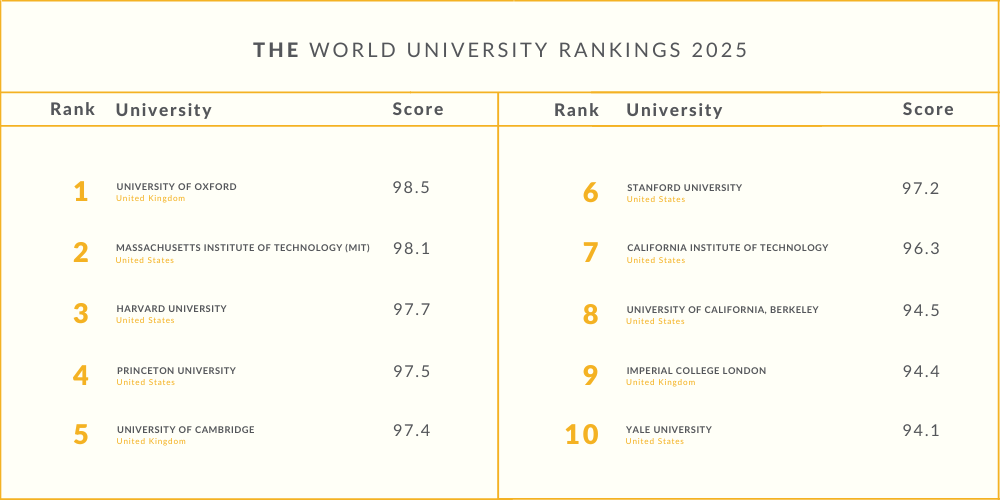
In the 2025 Times Higher Education World University Rankings Top Ten, the University of Oxford maintains its top position for the ninth consecutive year, boasting an impressive overall score of 98.5, with a perfect score of 100 in the Research Environment category. Four out of ten universities retained their positions from last year, while three improved and three slipped.
The Massachusetts Institute of Technology, for example, has climbed to second place from third last year, achieving an overall score of 98.1 with 99.2 in Teaching. In a similar vein, Harvard University has moved up to third from fourth, now scoring 97.7 and closely trailing Oxford with 99.9 in Research Environment. The University of Cambridge, meanwhile, remains in fifth place with a score of 97.4.
Princeton University has made a significant leap, rising from sixth to fourth place with a score of 97.5. In contrast, Stanford University has dropped from second to sixth, scoring 97.2. In seventh place, the California Institute of Technology holds steady with an overall score of 96.3, earning a perfect score of 100 on the Industry metric, alongside MIT and Stanford.
Furthermore, the University of California, Berkeley improved from ninth to eighth, achieving a score of 94.5. And finally, Imperial College London slipped from eighth to ninth with a score of 94.4, while Yale University continues to hold the tenth spot with a score of 94.1.
THE WUR 2025: University Performance Across Continents
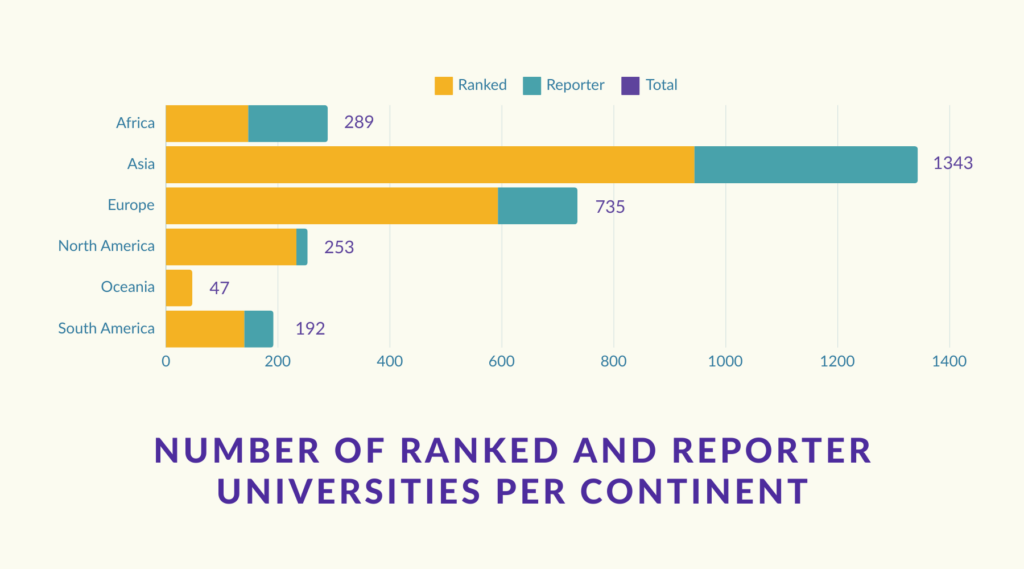
The total number of universities with reporter status has slightly decreased from 769 last year to 755 this year, with Asia continuing to lead with 399 reporter-status universities, followed by Europe (142), Africa (142), South America (52), and North America (20). Notably, Oceania has no universities with reporter status this year, meaning every institution that submitted data received a ranking. As for ranked universities, Asia again tops the list with 944, followed by Europe (593), North America (233), Africa (147), South America (140), and Oceania (47).
The top universities across different pillars reflect strengths in distinct areas of higher education. The United States leads in both the Teaching and Research Quality pillars, with strong representation from European institutions. In the Industry pillar, Asian universities stand out, with the highest concentration of top-ranked schools in this category. The Research Environment pillar sees a prominent role for European universities, though U.S. institutions remain dominant, along with a few Canadian universities. In terms of International Outlook, universities in the UAE have notably excelled, achieving near-perfect scores with Ajman University, Al Ain University, and the University of Sharjah securing three of the top five scores for this pillar.
THE World University Rankings 2025 Methodology
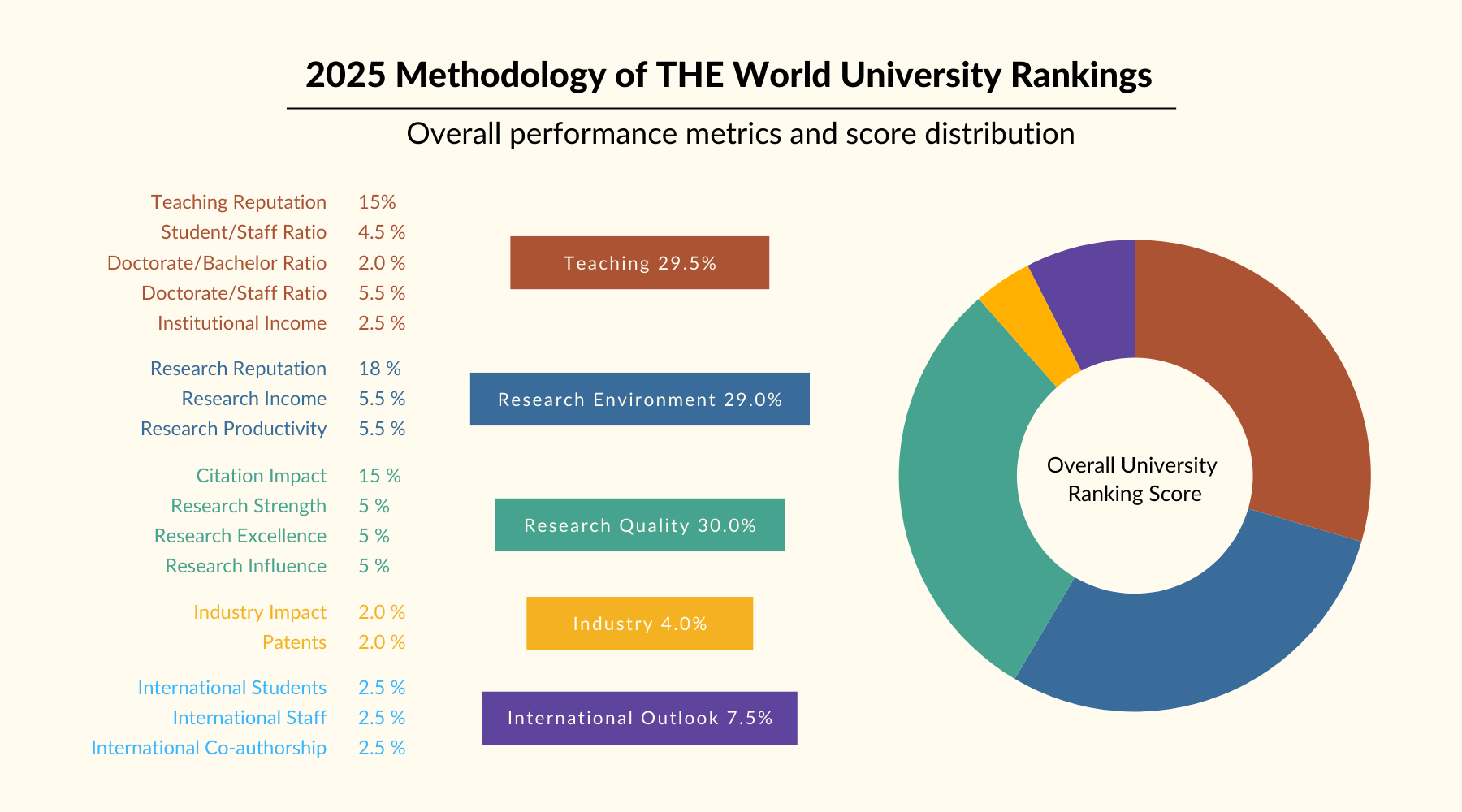
No new metrics have been added to the 2025 Methodology though slight changes have taken place in the way Times Higher Education analyses university data to compute citation impact. The millions of citations, articles, and tens of thousand of journals, supplied by Elsevier have been analysed by THE in 2025.
The general weight assigned to different metrics are as follows:
Research Quality holds the biggest weight, making up 30% of the final score, with Teaching being a close second, accounting for 29.5% of the total score. Research Environment is the third major metric at 29%. International Outlook still accounts for 7.5% of the total. And the latest growing metric since 2023, Industry sits at 4.0% for the past two years.
Most Represented Countries and New Entrants in THE World University Rankings 2025
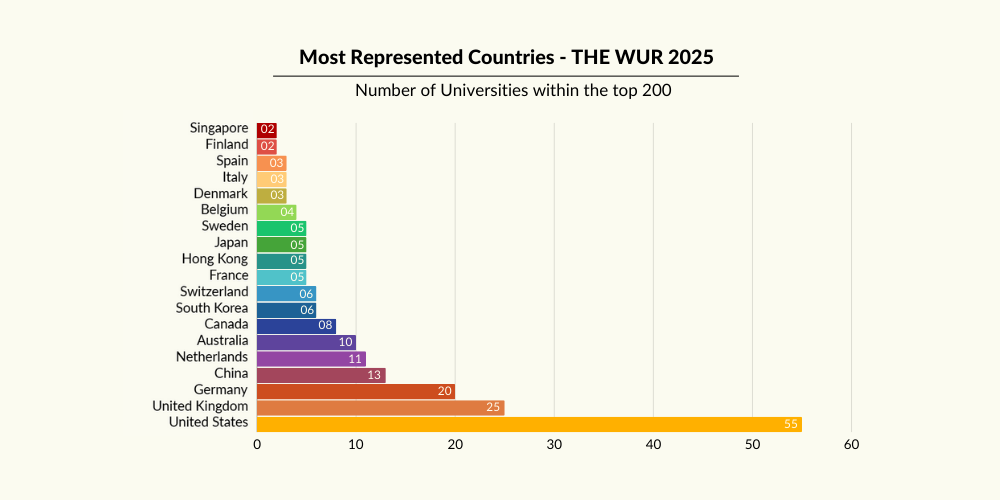
During the past four years, the top 200 has consistently featured 27 countries. This year, however, the number of countries represented on this chart has increased to 30, with the United Arab Emirates making an appearance for the first time. In addition to the countries already mentioned in the chart above, the following nations have each secured a university in the top 200: Austria, Brazil, Ireland, Macao, New Zealand, Norway, the Russian Federation, Saudi Arabia, South Africa, Taiwan, and the United Arab Emirates.
While the United States, the United Kingdom, and Germany still occupy the top three positions on the chart, a few universities from these countries have fallen out of the top 200 over the past years, illustrating the growing efforts and achievements of universities from other parts of the world.
Belgium, Canada, China, Denmark, France, Italy, Japan, South Korea, Netherlands, Singapore, and the United Kingdom have kept the same number of universities on the chart as last year. Among the territories that improved their representation this year were: Brazil, Finland, Hong Kong, Saudi Arabia, and Spain, each acquiring an extra university within the top 200 –except Spain which earned two universities on this list. In contrast, Australia, Germany, Sweden, Switzerland, and the United States have lost some representation this year.
Arab Universities in THE World University Rankings 2025
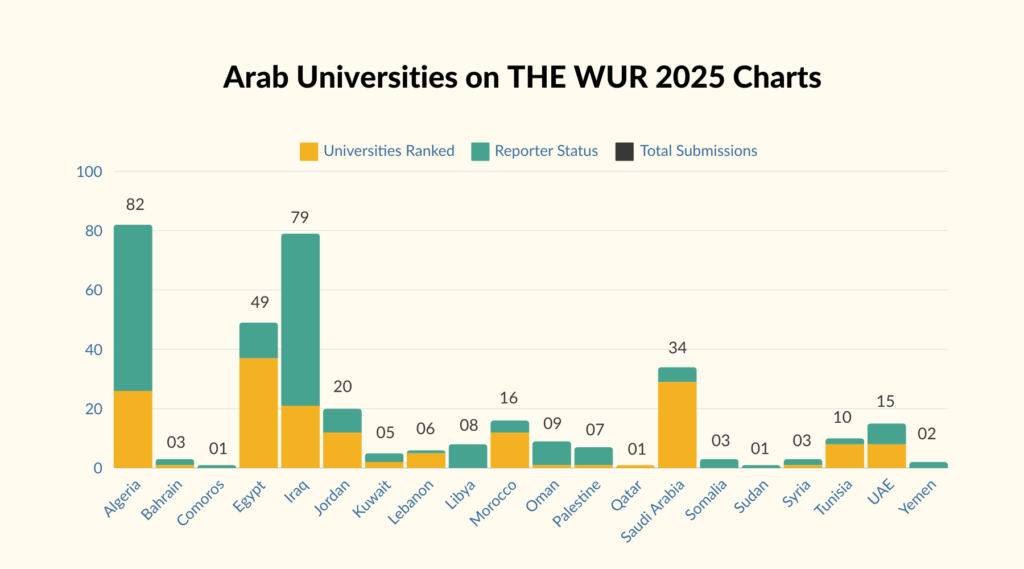
The rise in the number of ranked Arab universities, from 127 in 2024 to 165 in 2025, highlights a growing commitment to academic excellence and global recognition. A standout achievement is the UAE’s Abu Dhabi University, which rose in rank from the [251-301] bracket to joint 191th position this year.
Other notable regional developments include Algeria, which added three more universities to the rankings, and Bahrain, which now has one ranked university compared to none last year. Egypt saw a significant increase, with 37 universities ranked, up from 28 last year, while Iraq’s ranked universities grew from 13 to 21. Jordan and Kuwait also saw progress, with Jordan increasing from 7 to 12 ranked institutions, and Kuwait adding one ranked university, bringing its total to two. Morocco made a notable improvement, with one additional university ranked, bringing its total to 12.
Meanwhile, Saudi Arabia expanded its representation from 22 to 29 ranked universities. Despite these gains, Lebanon and Tunisia remained steady with five and eight ranked universities, respectively, while Oman, Qatar, and Palestine continue to have one university each. Syria made a debut this year with one university entering the rankings. Fortunately, no Arab universities have dropped off the rankings this year, and the overall progress appears quite promising.
Check out this online programme for a comprehensive overview of requirements and strategies that can help your university shine on the global stage.


